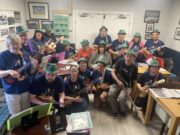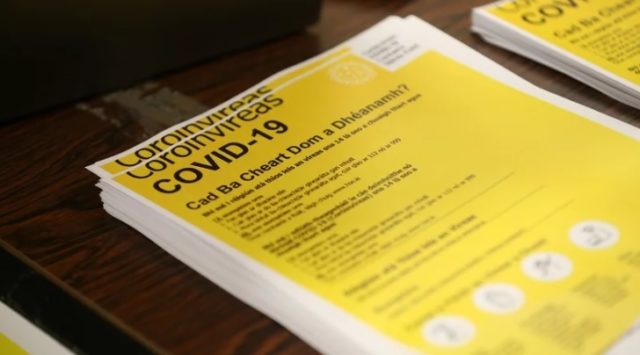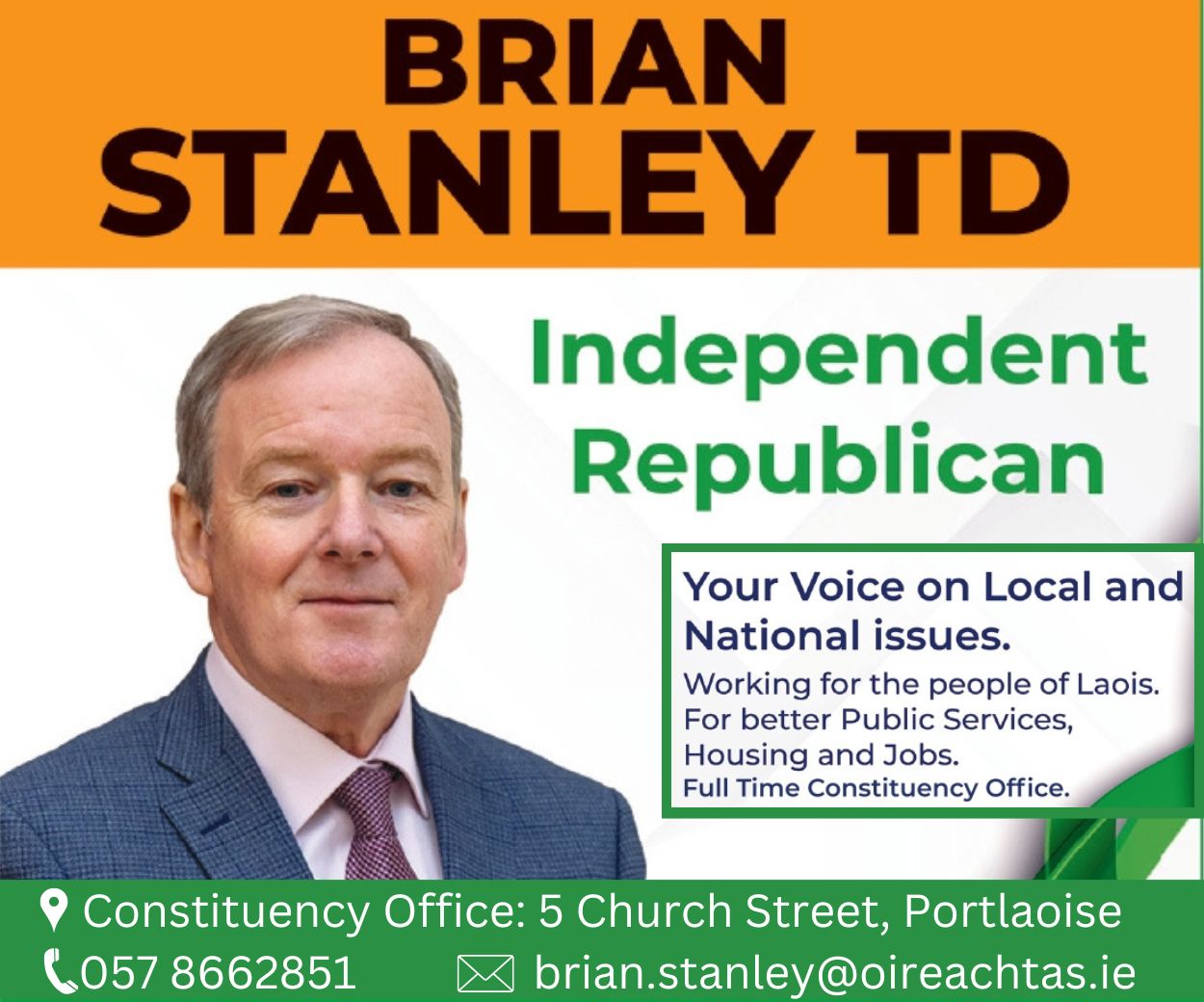For the next two weeks – from August 8 to 22 – Laois will be one of three counties under a new partial lockdown after the Government announced this evening the reintroduction of restrictions in Kildare, Offaly and Laois.
It follows concern at the rising number of Covid-19 cases in the three counties where almost half the cases in the country in the past two weeks have been concentrated.
In Laois alone, the number of cases has risen from 265 to 322 in two weeks. A number of the cases are in Direct Provision Centres in the county and many of the cases in the county are linked to outbreaks in meat factories in Kildare.
“The National Crisis Management Team met this afternoon to consider the advice of NPHET that additional measures be taken in the counties of Laois, Offaly and Kildare to contain and supress recent outbreaks of Covid-19 in that region,” said a statement this evening.
“We have decided to provide additional resources in support of our public health teams in the region, particularly in their contact tracing work.
“The National Ambulance Service have mobilised to provide additional pop up testing facilities in the region from tomorrow.
“Our regional Community Response Teams will provide communications and any necessary support to Long Term Residential Care facilities in Laois, Offaly and Kildare, including all nursing homes, both public and private.
“We will also be providing isolation facilities for those who cannot self-isolate in their homes or communal settings.”
HSE Chief Executive Paul Reid said, “We have worked so hard as a people to suppress this virus.
“Our success to date in containing the spread of this virus has been as a result of the solidarity of all of our people in following public health advice.
“We all need to redouble those efforts now, particularly in the three counties worst affected.
“I want to urge everyone to continue to wash their hands, maintain social distance, wear a face covering on public transport and in shops and sign up to the COVID App.
“If you have any symptoms, or are a close contact of a case, please come forward for a test.
“The people of Laois, Offaly and Kildare I know will be particularly disappointed tonight to be taking a step back.
“I want to assure them that the HSE will continue to bring every resource at its disposal to support them in reducing the spread of Covid-19.”
The restrictions come into effect at midnight tonight and remain in place for two weeks.
But what does it mean for you. Who can go to work? Can you go on a pre-booked holiday? How many people can you have in your house?
Travel and transport
You can only travel within your county, other than for the following reasons:
- to travel to and from work where that work cannot be done from home
- to attend medical appointments, collect medicines and other health products
- for vital family reasons, like providing care to children, elderly or vulnerable people, but excluding social family visits
- for farming purposes, food production or care of animals
You should not travel into any of these counties, other than for the reasons above, and unless travel through these counties is for the purpose of reaching a destination outside of these specified counties. In this regard, people should not stop in the specified counties, unless for essential purposes.
Public and private transport
You should not use public transport unless it is absolutely necessary to do so, and where possible you should not share private vehicles with others from outside your household.
Public health measures
You should continue do the things that will protect yourself and others. This is the best way of interrupting the transmission of the virus:
- frequent hand washing, cough and sneeze etiquette, avoid touching eyes, nose and mouth, regularly cleaning and disinfecting surfaces
- keep a safe distance of 2 metres from other people, especially those not among your close contacts
- minimise your number of close contacts as much as possible and keep a record of your daily contacts in order to facilitate rapid contact tracing if you are diagnosed with COVID-19
- wear a face covering when using public transport, in retail settings or any other indoor setting where physical distancing cannot be maintained
- know and self-monitor for the symptoms of COVID-19. If you have symptoms, you should self-isolate immediately and contact your GP without delay
- download the COVID Tracker app
- stay informed through trusted information sources and follow official public health advice
Education and childcare
The following services remain open with appropriate protective measures in place:
- education and childcare
- outdoor playgrounds, play areas and parks
Economic activity and work
Anyone in these counties who can work from home should work from home.
Social
Cafes and restaurants
All cafes and restaurants, including bars operating as restaurants, should only offer takeaway or delivery, or outdoor dining (maximum 15 people with strict physical distancing).
Hotels can remain open but must limit occupancy to essential non-social and non-tourist reasons. Existing guests can remain for the duration of their booking.
Indoor gatherings
All indoor gatherings should be restricted to a maximum of 6 people from no more than 3 households in total, while maintaining physical distancing.
Outdoor gatherings
Outdoor gatherings should be limited to a maximum of 15 people, while maintaining physical distancing.
Cultural and religious
All cinemas, theatres, casinos, betting shops, bingo halls, gyms, leisure centres, swimming pools, exercise and dance studios are required to close.
Attendance at a funeral service and burial or cremation ceremony should be limited to 25 outdoors. Indoor events connected to the funeral are limited to a maximum of 6 people.
Places of worship remain open for private prayer, while services are to be held online.
Sport
No sporting events or matches should take place, with the following exemptions:
- non-contact training outdoors in a maximum group of 15 people may continue
- professional and elite sports and horse-racing may continue behind closed doors
- inter-county training (max 15 people) and fixtures may continue behind closed doors
Residential and healthcare facilities
Visiting in long-term residential care facilities, acute settings and prisons will generally be suspended in the first instance with the exception of the most critical and compassionate circumstances (for example end of life).
The impact of COVID-19 on society in general and especially those living in nursing homes has been considerable.
We recognise that the proposed social distancing measures and restrictions on visiting, while introduced for the overarching public health good and for the protection of people, including those most at-risk, have an unprecedented impact on people’s daily lives, and recommending them is on foot of considered reflection of the potential risk at this time.
The serial testing programme in nursing homes will recommence next week on a fortnightly basis, with a focus on ensuring that facilities in the specified counties are tested early in the programme.
Advice for those over 70 years or medically vulnerable
The over 70s or medically vulnerable are advised to exercise individual judgement, and to stay at home as much as possible, and limit interactions to a very small network for short periods of time, while remaining physically distanced.
They are also advised the following:
- if exercising outside, keep 2 metres apart from others and wash your hands as soon as you get home
- avoid public transport
- you should shop during designated hours and wear a face covering. Family, friends and neighbours may be able to provide assistance with shopping once they adhere to physical distancing guidelines. Alternatively, online services may be considered
- shops should ensure that there are designated hours for over 70s and medically vulnerable
- if these options are not available to you, you can contact your local authority who are working with local organisations to make sure that people have access to food, essential household supplies and medicines
SEE ALSO – Coronavirus: Four new deaths and 98 new cases as face coverings confirmed for secondary school


























